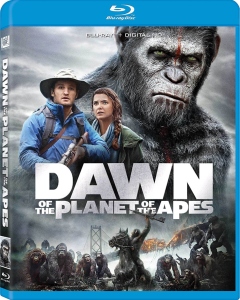The “Planet of the Apes” franchise shows us we’re not much different from apes, and we’re both victims of our respective races’ propensity for violence and destruction. But 2011’s “Rise of the Planet of the Apes” gave the apes a fresh opportunity: Caesar (Andy Serkis plus motion capture computer effects), the first member of a new breed of apes with genetically enhanced brains, grew up in modern human society, and he learned morality from – as Caesar calls him – “a good man,” Dr. Will Rodman (James Franco).
So rather than rising toward civilization in fits and starts and lots of bloodbaths like humans did, the apes embrace moral commandments like “Apes not kill apes” and “Apes strong together.” Within Caesar’s lifetime – he’s now a husband and father of two in 2014’s “Dawn of the Planet of the Apes” (now available at Redbox) — the apes are a thriving, peaceful civilization in the woods outside San Francisco.
Meanwhile, the humans – victims of a “simian flu” of their own creation – have been knocked back a few pegs. The human outpost in the Bay Area – led by Dreyfus (Gary Oldman) but particularly represented by this film’s “good man,” Malcolm (Jason Clarke of next summer’s “Terminator Genisys”) — needs access to the hydroelectric dam in apes territory in order to keep the power on.
“Dawn” starts off by showing us apes on the hunt in the woods, with Caesar leading via hand signals. When Carver (Kirk Acevedo of “Fringe”) shoots an ape, it seems we’re presented with a flipping of the script: We’ll root for the apes and against the humans. However, “Dawn” is smarter than that. Ultimately, we root for the good guys – Caesar and Malcolm and their respective friends and families – and against the bad guys, regardless of their species: Just as Carver is the humans’ resident a–h—, Koba (Toby Kebbell) fills the role on the apes’ side.
“Dawn” is a shining example of special effects used as story-enhancing tools rather than as distractions from a thin story. Caesar stole the show in “Rise,” and he’s again the star here, but the sequel features a smorgasbord of fully realized apes. It’s not a knock on the human actors – and this is a loaded cast, also including Keri Russell – to say the apes’ performances are just as good, if not better. While Caesar talks a fair amount and the other apes occasionally bark out a word or two, they mostly communicate with sign language and human-esque facial expressions. If you don’t get choked up at some of the scenes between Caesar and his son, you’re not human … or ape.
Despite offering perhaps the most – and the most epic – apes-versus-humans battle action of any of the eight “Apes” pictures, “Dawn” serves up lots of food for thought about how wars happen and what good people (or apes) can do (if anything) to prevent wars. The film doesn’t fall cleanly into an anti-war or anti-gun box (although it is both of those things, somewhat), and it cleverly presents the negative side of “Ape not kill ape” and “Apes strong together.”

In the 1968 original, we were shown that if humans blow themselves up in worldwide nuclear war, the peaceful apes will surpass humans on the evolutionary scale like the tortoise passing the hare. In the franchise prequel “Rise,” we met Caesar, the first ape – the missing link, if you will – to take that step toward “humanity.” But “Dawn” isn’t so optimistic about this supposedly enlightened breed: Caesar admits he thought apes were better than humans, but at their core, they are the same as humans.
It’s not enough for “Dawn of the Planet of the Apes” to say “If we just got rid of our guns, we’d be fine,” or “If we just lived in harmony with nature, we’d be fine.” The film argues that the root cause of so many problems is humans’ (and apes’) propensity for fear and embrace of leaders who inspire fear or tribalism. In other words, the root problem of human nature is that we’re animals.

